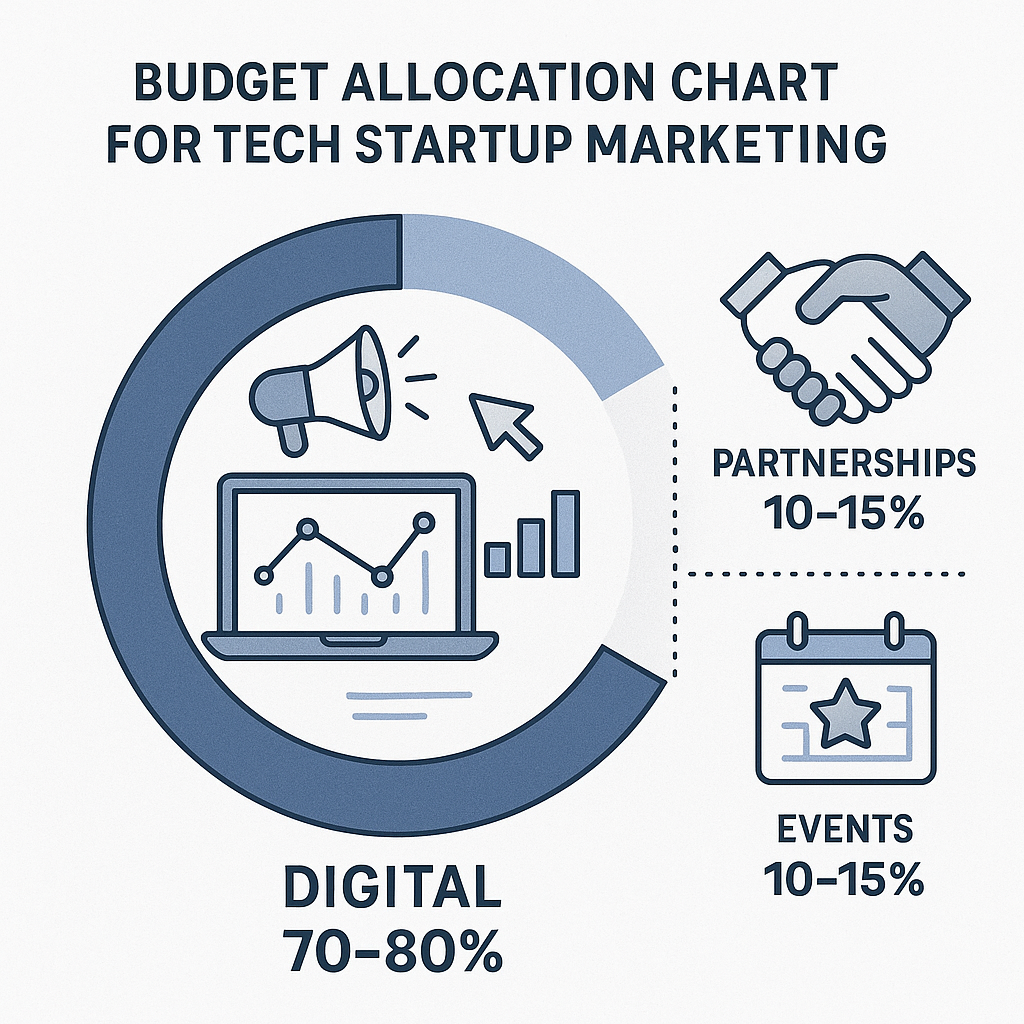In today’s fiercely competitive landscape, tech startup marketing has evolved from optional to essential for sustainable business growth. The days when innovative features and competitive pricing alone could drive adoption are behind us. Modern tech startup marketing requires a sophisticated approach that integrates data-driven decision making, authoritative thought leadership, and authentic storytelling. For growth-focused tech startups wondering how to allocate limited marketing resources effectively, it’s time to implement proven tech startup marketing strategies specifically designed for today’s discerning B2B buyers.
How Has the B2B Tech Buying Process Transformed Tech Startup Marketing?
Recent research from Gartner and Forrester reveals fundamental shifts in tech startup marketing requirements. According to Gartner’s 2025 analysis, enterprise technology decisions now involve an average of six to ten stakeholders, each with distinct evaluation priorities. Technical teams prioritize integration capabilities and interoperability. Procurement leaders focus on total cost of ownership (TCO) and contract flexibility. C-suite executives evaluate strategic alignment, scalability potential, and future-proofing capabilities.
This multi-stakeholder decision process requires tech startup marketing to deliver information through diverse formats. Forrester’s 2025 B2B Buyer Behavior Study shows that decision-makers increasingly rely on a combination of content types—webinars, detailed whitepapers, case studies, and peer reviews—to validate vendor claims. They consult industry analysts, seek insights from business publications like Harvard Business Review, and participate in digital communities for real-time feedback. As AI-powered recommendation engines and comparison tools become standard, effective tech startup marketing must provide transparent, data-rich content.

Which Tech Startup Marketing Channels Deliver the Best ROI?
High-Impact Events with Digital Integration
Strategic industry events remain powerful trust-building opportunities in tech startup marketing. These venues enable live product demonstrations, face-to-face discussions, and meaningful relationship development. However, resource constraints demand selectivity. Rather than spreading resources across numerous events, successful tech startup marketing focuses on gatherings that attract specific target audiences.
To maximize event ROI, leading tech startup marketing teams now implement hybrid engagement strategies—incorporating augmented reality demonstrations, QR-code activated product guides, and digital follow-up sequences. This integrated approach ensures consistent engagement with prospects across both physical and digital touchpoints.

Thought Leadership in Targeted Publications
Establishing credibility through strategic content placement in respected industry publications delivers exceptional value in tech startup marketing. Articles in publications like MIT Sloan Management Review or industry-specific journals provide third-party validation that builds market trust. Technical content authored by your CTO or product leaders can showcase expertise and forward-thinking perspectives, positioning your tech startup as an industry authority rather than just another vendor.
Why Is Content Marketing Essential for Tech Startup Growth?
Content marketing has emerged as the cornerstone of effective tech startup marketing strategies. The 2025 Content Marketing Institute report reveals that over 75% of B2B technology buyers consume multiple content pieces before making purchase decisions. This consumption pattern creates multiple opportunities to influence the buying process through strategic tech startup marketing content development.
Data-driven whitepapers highlighting measurable outcomes, instructional videos demonstrating integration processes, and authentic customer testimonials addressing implementation challenges all serve specific purposes in the buyer’s journey. Each content type should be designed to address particular stakeholder concerns and decision criteria.
LinkedIn has established itself as the premier distribution channel for tech startup marketing content. Brief LinkedIn articles, data visualization snippets, and concise video insights help maintain visibility with target audiences. Complementary channels like industry-specific podcasts and virtual roundtable discussions enable deeper exploration of complex topics, providing valuable context that differentiates your solution from competitors.
By consistently delivering educational content that addresses specific pain points, tech startup marketing builds trust, establishes credibility, and helps prospects envision solutions as essential components of their technology ecosystem.

How Can Tech Startups Build a Credible Brand with Limited Resources?
In B2B technology markets, brand credibility directly impacts sales cycles and conversion rates. Effective tech startup marketing isn’t achieved through isolated campaigns but through consistent messaging and demonstrated performance. Customer success narratives, third-party validations (such as Gartner Peer Insights recognition or industry awards), and compliance certifications (like SOC 2 for security or ISO standards) collectively reinforce brand promises.
Strategic partnerships with established technology providers create powerful credibility-building opportunities for tech startup marketing. Joint webinars, co-authored case studies, and collaborative marketing initiatives allow early-stage startups to leverage the established reputation of recognized market players. In competitive technology markets where trust directly impacts purchase decisions, these strategic alliances provide invaluable credibility acceleration.
What Role Does AI Play in Modern Tech Startup Marketing?
The integration of AI and advanced analytics is transforming both tech startup marketing execution and buyer behavior. For startups, AI-powered lead scoring and predictive analytics tools enable precise prospect identification, personalized communication, and message optimization. Simultaneously, buyers increasingly rely on AI-assisted evaluation tools to compare solutions. This shift requires tech startup marketing to provide structured, machine-readable information—detailed specifications, documented APIs, and standardized performance metrics—to facilitate AI-powered comparisons.
Virtual product demonstrations, digital twins, and simulated deployment scenarios are becoming standard buyer expectations, allowing risk-free solution evaluation. As these technologies mature, successful tech startup marketing increasingly depends on data-driven storytelling. Startups that prepare for this evolution by developing comprehensive knowledge bases, detailed documentation, and flexible integration frameworks position themselves for sustainable competitive advantage.

Why Does Authenticity Matter in Tech Startup Marketing?
Despite technological advancement, authenticity remains fundamental to effective tech startup marketing. Today’s sophisticated buyers appreciate transparent discussions about implementation challenges, integration complexities, and realistic ownership costs. Nuanced, honest communication builds lasting relationships based on trust rather than transactional interactions.
While AI streamlines tech startup marketing processes, human expertise and strategic guidance remain irreplaceable. Effective marketing strategies balance technological efficiency with human insight. Sales teams freed from repetitive tasks can focus on consultative interactions, helping clients navigate complex decisions and tailoring solutions to specific organizational needs.
How Should Tech Startups Allocate Their Marketing Budget in 2025?
Based on performance data across hundreds of successful tech startup marketing initiatives, we recommend the following budget allocation framework:
•Digital-First Approach: 70-80% (content marketing, SEO, targeted advertising, marketing automation)
•Strategic Partnerships: 10-15% (joint marketing initiatives, integration programs)
•Targeted Events: 10-15% (industry-specific conferences, executive roundtables)

Key Tech Startup Marketing Takeaways for 2025
For B2B tech startups, marketing success in 2025 requires integrating established credibility channels with innovative digital approaches, data-driven insights, and authentic thought leadership. By developing a multi-dimensional tech startup marketing strategy that combines strategic event participation, authoritative content development, targeted social engagement, and AI-powered personalization, early-stage companies can establish the foundation for sustainable growth.
The most successful tech startup marketing programs blend technical expertise with compelling storytelling. As B2B purchasing becomes increasingly data-driven, collaborative, and efficiency-focused, startups that implement these tech startup marketing strategies will accelerate their path to market leadership.
About 8scale: We help tech startups, scaleups, and established technology companies develop and implement data-driven marketing strategies that drive measurable growth. Our consulting services combine deep industry expertise with practical implementation support to help technology companies achieve sustainable competitive advantage through effective tech startup marketing.
Sources & Further Reading:
•Gartner Research: “The New B2B Buying Journey” (2025)
•Forrester: “B2B Buyer Behavior Study” (2025)
•Content Marketing Institute: “B2B Technology Content Marketing Benchmark Report” (2025)
•Harvard Business Review: “The Evolution of Enterprise Technology Purchasing” (2024)
•MIT Sloan Management Review: “AI-Powered Marketing in the Technology Sector” (2025)




